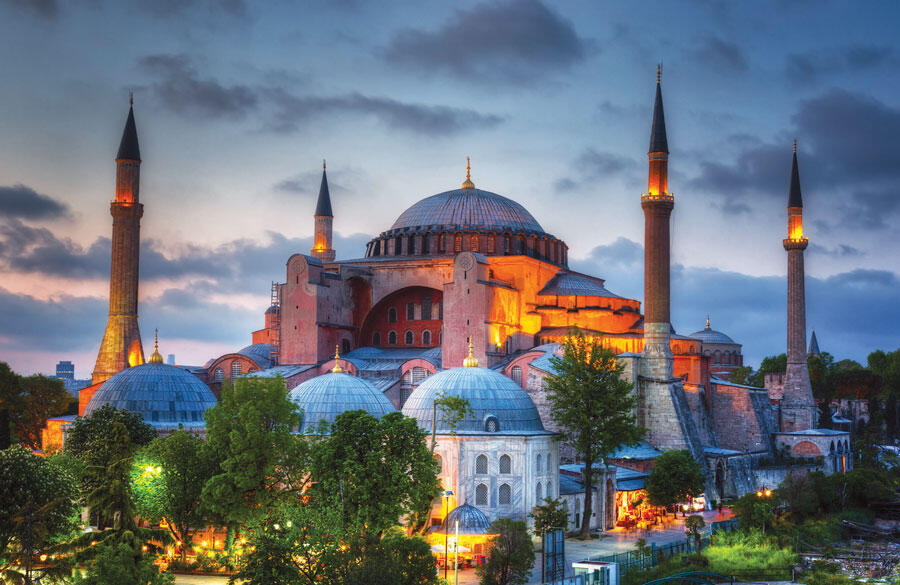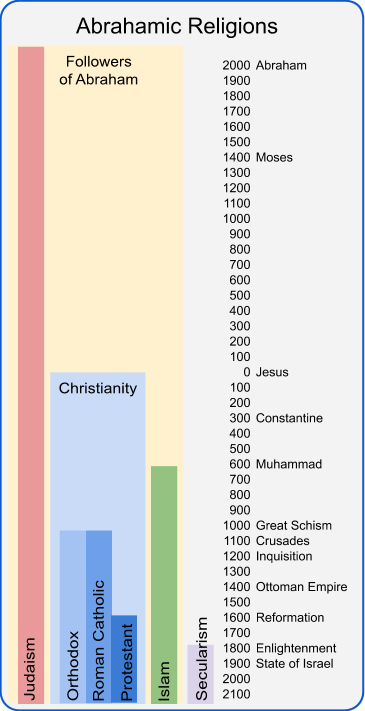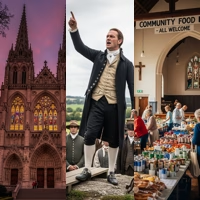Hagia Sophia to become a mosque – again
Turkish President Erdogan has announced Hagia Sophia will revert to being a mosque, with Muslim prayers to be held there again from July 24 2020.
Origins
The Hagia Sophia Cathedral in Istanbul was not named after a female saint; the name means Holy Wisdom – a reference to Jesus, the Wisdom of God – and was given a hundred years later to a Church originally commissioned by Constantine I in 325 CE, on the site of an earlier pagan temple. Rebuilt several times after fires, the present building was erected in the 6th century CE under the direction of the Byzantine emperor Justinian I and is considered an architectural marvel, both in terms of its size and its amazing dome structure.
For more than a millennium Hagia Sophia was the Cathedral of the Orthodox Patriarchate of Constantinople, with a brief interruption in the 13th century when it was converted to a Roman Catholic cathedral by the Fourth Crusaders.

After the Turkish conquest of Constantinople in 1453, Mehmed II had it repurposed as a mosque, which it remained during the heyday of the Ottoman Empire, until in 1934 the Turkish President Kemal Atatürk secularized the building, and made it into a museum.
Pagan – Orthodox Christian – Roman Catholic – Muslim – secular – and now Muslim again. So the wheels of history turn.
Does it matter?
The World Council of Churches – representing 350 Orthodox and Protestant Christian denominations – is ‘dismayed’ that the museum should be turned back into a mosque. The Roman Catholic Pope Francis has said he’s ‘pained’ by Turkey’s decision. President Erdogan has defended his action.

Surely, all these faiths revere the same deity – God or Allah – don’t they? All recognise Abraham, Moses and Jesus as central figures of their religion. Christians claim Jesus was the unique Son of God; for Muslims He was one of the greatest prophets, because God cannot appear as more than one person.
Some Churches disagree about the role of the Holy Spirit, the third member of the divine Trinity. And the hierarchies and rituals vary greatly from one to another.
But is it worth fighting about?
In the 7th century, Islam was founded by the Prophet Muhammad. Ecclesiastical differences and theological disputes between the Greek and Latin Churches culminated in the Great Schism of 1054. The Crusades in the 11th to 13th centuries were terrible times of cruel warfare between different Christian factions and Muslims. The Inquisition starting in the 12th century and the Reformation in 16th-century Europe were further bitter struggles between different Christian groups, leading to much loss of life and hundreds of thousands of refugees. But why?
Secularism
At the end of the 17th century, the French Revolution ushered in the Age of Enlightenment. Darwinian evolution theory and other scientific developments – together with a rampant disillusionment with religion – led many in the West to adopt a secular humanistic position, rejecting most of the tenets of the monotheistic faiths.
Was that any better? I find I can’t believe in no God.
Peaceful co-existence

A couple of years ago, I had the honour of attending a Palestinian-Lebanese wedding celebration in Beirut – a city that has seen more than its fair share of religious conflicts. It was an elaborate, joyful occasion. Most of the guests were Muslim, a few Christian, but together we wished the beautiful couple health, happiness and God’s blessings.
While in Lebanon, I did some sightseeing. One thing that impressed me was to visit the recently built Mohammad Al-Amin Mosque. It stands, majestic, right next to the historic Martyrs Square, which later formed part of the Green Line separating the Muslim western from the Christian eastern sections of the city. Just behind the mosque is the much older Christian Maronite Cathedral of Saint George.
So, at the focal point of historic religious conflict, two dissimilar places of worship proclaim the possibility of peaceful co-existence.
Of course, tragic experiences and wounds are passed from father to son over many generations; it’s not easy for an injured ethnic group to forgive their persecutors.
And, of course, fundamental differences about what we believe and how we practise our faith do exist between religions. I don’t ask anyone to deny their doctrine and heritage. However, it is possible to respect our differences without fighting over them. In fact, we may go so far as to honour and perhaps learn from each other’s strengths.
Jesus said: ‘Whoever does God’s will is my brother and sister and mother.’ (Mark 3:35)


